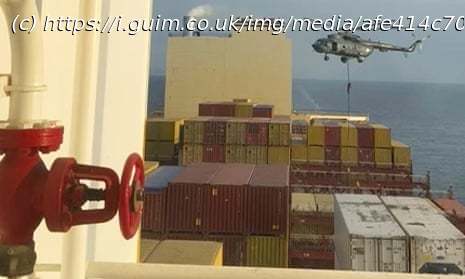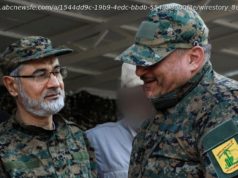As Tehran seizes a cargo ship in the Strait of Hormuz, Israelis are tense, waiting for next step
The world is watching Iran. After Israel assassinated a senior commander in an embassy annexe in Damascus, the one thing every diplomat, general and politician from Tehran to Washington could agree on was that Iran would have to respond.
There has been nearly two weeks of speculation about when, where and how, fanned by US intelligence reports that Iran or its proxies were preparing for strikes on Israel.
On Saturday, days after Tehran said it could close the world’s most important oil shipping route, the Strait of Hormuz, its Revolutionary Guards seized a cargo ship linked to Israel and took it into Iranian waters. Israel accused Tehran of piracy and a military spokesman said it would “bear consequences” for further escalation.
For days, the Israeli airwaves have been dominated by anxious discussion of possible targets and Iran’s arsenal.
The military tried to calm nerves by announcing there was no need to stock up supplies, but some school principals texted parents to be prepared for online learning, and some municipalities have opened shelters.
That in itself marks a victory for Tehran, said Yagil Levy, professor of military sociology at the Open University of Israel. “Iran doesn’t have to do anything. It has an achievement in that most Israelis are now terrified, afraid of leaving their homes – many are travelling abroad, cancelling plans,” Levy said. “I guess that someone in Tehran is following the events of Israel with a lot of pleasure.”
Iran’s options range from a direct attack on Israeli targets from its own soil – the most provocative choice – to using Hezbollah in Lebanon, militias in Iraq or the Houthis in Yemen to attack Israeli-linked targets abroad.
A direct attack from Iranian soil would mark a significant departure from the country’s record of restrained response to attacks, said Maryam Alemzadeh, associate professor in Iranian history and politics at Oxford University. “The government has called it ‘strategic patience’ to ideologically appease its minority hardliner supporters. But it has been the right strategic move in realpolitik terms as well,” she said.
“Iran’s military equipment is at best suitable for asymmetric warfare only; it cannot rely on international support, even from lukewarm allies China and Russia; and its economy is on the brink of collapse due to years of international sanctions and domestic corruption and mismanagement.
Home
United States
USA — Political World waits anxiously for Iranian response to Israel’s killing of top general






